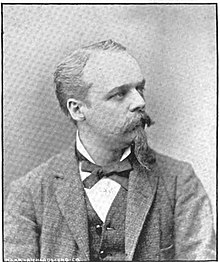Klas August Linderfelt
| Klas August Linderfelt | |
|---|---|
 |
|
| Born | 1847 Sweden |
| Died | March 18, 1900 |
| Occupation | Librarian |
| Nationality | Swedish American |
Klas August Linderfelt (1847 – March 18, 1900) was an American librarian. A native of Sweden, he emigrated to Milwaukee, Wisconsin and became a teacher and a librarian. As the first librarian of the Milwaukee Public Library, he became a significant figure in the city and in the library profession, becoming the seventh President of the American Library Association. He left both the city and the profession permanently following his arrest for embezzlement.
Linderfelt was born in Sweden in 1847. He became an orphan after the deaths of his mother when he was five and his father when he was eleven. Linderfelt persevered and earned a doctorate from Uppsala University. He emigrated to Milwaukee in 1870 and taught classics at Milwaukee College. In 1875, he was married to a woman whose name has been reported as Maggie Cooper or Margie E. Parker. By 1880 they had the first two of their four children, a son and daughter, and lived modestly at 278 Pleasant Street.
The Milwaukee Public Library dates to February 7, 1878, when the Wisconsin State Legislature authorized the city to form a public library. Linderfelt had taken an interest in libraries and was hired to be its first librarian in 1880. With his new post, Linderfelt joined the ranks of Milwaukee's elite and his family took up residence on Grand Avenue. He also made the acquaintance of numerous important figures in the library profession, and was especially close to William Frederick Poole.
Under Linderfelt's leadership, the Milwaukee Public Library developed a new charging system and a pencil dater for due dates that was widely adopted by libraries. He wrote professional articles and his book Eclectic Card Catalog Rules, based on the work of Karl Dziatzko as well as numerous English language librarians like Melvil Dewey, was published by Charles Ammi Cutter in 1890. He also wrote on other topics, such as the book Volapük: An Easy Method of Acquiring the Universal Language (1888), about the constructed language.
...
Wikipedia
